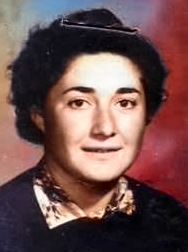Betty Levy's Recollections
My earliest contact with Betar was when the family one Sunday went to visit my younger cousin Harold Helmer at the Betar Camp on visitors day. I subsequently discovered that my older cousin Miriam Lubofsky was also there. It must have been Christmas time approximately 1952/53. Upon arrival we were greeted by that larger than life character Yosef Steiner. A whole other story should be written about the charismatic and utterly dominating personality of Yosef Steiner and his role in the resurrection of Betar Australia and the way that he was able to drive, inspire and create a national youth movement whose motto became “162 smiling faces”. Suffice for this article is to say that Yosef was able to persuade my parents to allow myself and my sister to join Betar that year .
From then on we attended every Sunday afternoon at Beth Weizmann. I have no doubt that that the only reason that I and my sister were allowed to attend Betar meetings was the persuasive and charming personality of Yosef. In those days we girls were much more restricted than is the practice today. It was also helpful that as we only attended a State school Betar was our only access, apart from Sunday morning Jewish school which we hated with a passion, to Jewish friends. So my sister Fay and I were driven weekly to Beth Weizmann where we were indoctrinated with the Revionist version of Jewish and Zionist history and the founding of Israel.
Our group was variously led by leaders such as Philip Mirjam Rosette Mirjam, Leah Feder, Aaron Ninedek.
Eventually some of us were chosen to take on a leadership role and we were formed into a leadership training group. Apart from myself there was, Freda Goldstein, Hazel Lew, Jack Katz, Gary Rudzki, Benzion and Varda Eizikovich. We were led by Jack Mirjam. Shimshon Feder, Theo Balberyszski, Sam Offman and our inspirational and revered Shaliach, Gad Pedhazur.
As very protected Jewish girls it was of course out of the question that we should ever be allowed to go to a camp where boys and girls would share facilities and be only under the supervision of other not so very much older Jewish girls and boys. So we missed the first camp or two. However by the time I was selected for leadership training I decided, after many talks from our leaders, that it was not acceptable for me not to attend a camp. So on the day of the camp we two older sisters bribed Hilda our youngest sister to stay at home and to not ring our parents, who were working in the family business, to alert them to the fact that we had departed to camp. We took the tram to Beth Weizman where we just got on the bus for camp as if it was the most natural thing in the world to turn up and go to camp without parental permission.
So we ran away to our first camp. It was pretty scary, I didn’t know if my father would follow us to camp and make a scene in front of everybody or not, But he didn’t. On the way home we worried about what the consequences of our first major disobedient act might be and felt sneakily heroic, just like the Maccabees or the Etzel fighters against the British. Our cousin Harold kept predicting all sorts of consequences . We finally arrived in Melbourne and were subjected to all the angry comments and threats that you could possible imagine but we were still allowed to see that first major Israeli film to come to Australia “ Hill 24 Doesn’t Answer”. Anything else I’ve forgotten. Needless to say there never ever was a question about going to camp again.
We graduated the seminar and were given our leadership colours and went out to take our first groups. Jacky Katz and I were assigned to help Allan at East Brighton and in our little group were Louis and Emmy Devries and their cousins the Dezoute brothers. Eventually we took over ourselves and so for a number of years we took our groups on Sunday afternoons and met together as a group on Sunday Nights. The highlight of each year was camp.
My first summer camp was the first year that I was a leader and I had charge of a tent of 8 Hashmonaim girls and believe me I was as homesick as they were. So I worked like mad to hide the fact and kept us all as busy as I could, I was praised for having the tent with the most chevra and spirit, but really I was just covering up my own feelings of being scared..
Over the next few years we said farewell to Yosef and Dora, Shimshon and Leah, Jack and Rosette, Theo, and many others who left on Aliyah and made way for new generations of leaders to emerge and take over.
Over the years, in my own experience ,working as a psychologist with adolescents, and from research of those in the field it is very clear that the inability of young people to have such life affirming experiences are the cause of the problems that many of them are facing today.
Those years in the movement were an exciting, demanding, exhilarating challenge which changed my life and my perception of myself for ever. I believe they were the same for everyone of you who might still be reading this. Where else would we have been able to gain our self respect, practised leadership, multitasking , become responsible adults and had fun all at once. We made friendships that have lasted a lifetime and we were inspired.
Article submitted in honour of Betar's 80th Anniversary
By Betty Levy [nee Brisson]
Ex Mefakedet Melbourne
Years in Betar 1952- 1961 (approx)
© 2004 Betty Levy

